6.1 LEGAL FRAMEWORK. ROYAL DECREE 1434
Although the legal framework for the distribution and marketing of piped natural gas is subject to specific updates, a complete update of the regulation of the “supply” of piped natural gas, which is included in Item III of RD 1434/2002 of December 27, which regulates the activities of transportation, distribution, marketing, supply and authorization procedures for natural gas installations, is due. In this Item III, key aspects for distributors and marketers of piped natural gas, and for users and consumers, require regulatory updating due to their obsolescence. These aspects include suspension and termination of supply for technical reasons, for non-payment, for termination of the supply contract and for breach of obligations by users and consumers; fraud, the inspection of measuring equipment and gas reception facilities, and the liquidation of defrauded consumption; verification, checking, inspection and reading of the measurement and control equipment, and the liquidation of the consumption with anomalies; the promotion and financing of facilities for the consumption of piped natural gas; essential supplies and injection of biomethane into the natural gas distribution network.
The MINETAD has requested from SEDIGAS, which represents carriers, distributors and marketers, a proposal for regulatory updating for the first quarter of 2018 in which working groups for each activity participate and a steering group composed of representatives from each area.
6.2 NGV DEVELOPMENT
The current transport model is not sustainable in the medium term. Virtually one hundred percent of the energy consumed is obtained from oil, with limited global reserves, concentrated in geopolitically complex areas and at volatile prices.
In addition to being a great opportunity for the consumer, a greater development of NGV for mobility entails the promotion of new product perspectives for the industry of the automotive sector in Spain.
The diversification of energy sources in transportation is a pressing need. Natural gas is distinguished by greater price stability, independent of the price of crude oil, and a scope of application in all segments, short, medium and long overland haul, maritime and rail.
For this reason, for Madrileña Red de Gas, the expansion of NGV continues to be a strategic objective.
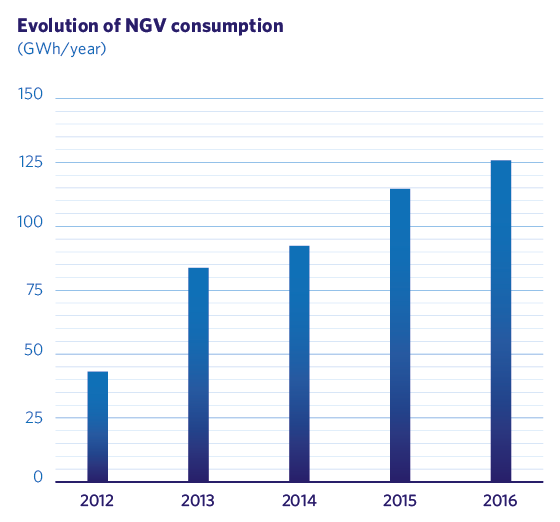
For MRG, the expansion of NGV continues to be a strategic objective. Its development for mobility entails the promotion of new product perspectives for the automotive sector industry in Spain
Throughout this financial year, we have expanded the infrastructure for the supply to the bus company Grupo Ruíz (the private company with the largest number of vehicles powered by NGV in the Community of Madrid), to which we have provided sufficient capacity for an annual increase of new vehicles.
Except in the Avenida de América transport hub, buses powered by natural gas continue to have restricted access to other hubs in Madrid, and although there has been progress in this situation, the horizon that is being considered for authorization is still far away. The Madrid Regional Transport Consortium has tendered and awarded the completion of a project with technical and regulatory requirements for Spainaccess authorization, as well as the completion of the basic studies of each hub. This must be followed by the relevant regulatory amendment and the final completion of the construction projects of the necessary adjustments.
On the other hand, this year we have connected to our distribution network the new Aliara Energía public supply station, on Avenida de los Poblados. Its location is of special importance for light professional transport, as well as for the individual user, as it is located in an essential communication route in the south of Madrid.
The latest measures adopted in the Air Quality Plan of the City of Madrid and Climate Change will help to boost the use of NGV. EMT will increase its number of buses as well as the capacity of its refuelling station in the Carabanchel depots.
The municipality of San Lorenzo de El Escorial is a clear example of the great potential that this sector represents for MRG. The passenger transport company of this municipality already has a NGV service station for the loading of its buses, which represents 11% of the natural gas consumption of the municipality, being especially relevant in the summer months as it is a seasonally adjusted consumption.
MRG is another example of vehicles that can be operated with NGV. More than 96% of the mileage that our fleet performs is fuelled by NGV in the public stations that exist in the Community of Madrid. In addition, the use of NGV in day to day life has helped to improve air quality in Madrid, with 1 MT less NOX and emissions of 13.5 MT of CO2.
This has earned us the Muévete Verde Award for Energy Efficiency from Madrid City Council.
More than 96 % of the mileage performed by the MRG fleet is fuelled by NGV in the public stations that exist in the Community of Madrid
In our sector, we have been working for years on the displacement of other energies that are more polluting than natural gas, and it transpires that the transport sector, which uses half of the energy consumed in Madrid, has not taken the technological leap that they have given other sectors such as the industrial, the commercial or the domestic.
At MRG, as a partner of Agremia, we are encouraging fleets of our associates, which mostly comprise vans or industrial vehicles, to also incorporate NGV vehicles.
Within the framework of the collaboration agreement signed with the Volkswagen Group, which is increasing the number of models powered by NGV, especially the SEAT brand, we continue to play an active part in NGV promotional sessions, conducting training sessions at the group’s main dealers.
6.3 MADRID AIR QUALITY AND CLIMATE CHANGE PLAN
Ensuring the protection of the health of citizens against the effects of air pollutants, contributing to the fight against climate change and reducing greenhouse gas emissions are the main objectives of Plan A for Air Quality and Climate Change, approved by Madrid City Council, based on the principles of sustainability.
The plan aims to comply with European and national legislation on air quality by achieving air quality levels consistent with the guideline value of the World Health Organization.
The objective is ambitious. It is to reduce, by 2030, 40% of the total emissions of greenhouse gases (GHG) of the municipality of Madrid with respect to 1990, and adopt a commitment to reduce 50% of emissions caused by urban mobility in 2030, with respect to 2012. To which is added the development of an adaptation strategy in the face of the effects of climate change.
For this, Plan A promotes the development of 30 measures, organized into four lines of action:
- Sustainable mobility.
- Urban regeneration.
- Adaptation to climate change.
- Citizen awareness and communication.
Madrid City Council’s Plan A for Air Quality and Climate Change seeks to reduce 50 % of emissions caused by urban mobility in 2030, compared to 2012
For MRG, the first two lines of action are key to achieving the objective of reducing emissions of air pollutants, the main problem in Madrid city centre. The plan includes actions on road network and public space aimed at reducing the intensity of private traffic and the promotion of public transport, as well as active modes of mobility.
It also includes actions related to the mobile fleet of key sectors with high impact on air quality and the promotion of sustainable employment mobility and shared mobility. In this field, the use of NGV is vital for the achievement of its objectives, which are the following:
- Renewal of the EMT fleet (700 buses will use NGV).
- Renovation of taxis with environmental criteria (ZERO or ECO), incentives for the elimination of diesel vehicles.
- Merchandise distribution: reservation in loading and unloading areas, preferential conditions for low emission vehicles and renewal of the mobile fleet.
- Fleets of municipal services: ZERO and ECO utilization.
- Promotion of alternative energy charging stations.
In terms of urban regeneration, the focus is on the promotion of the use of renewable energies. Amongst others, it is worth mentioning:
- The promotion of the replacement of polluting heating fuels: prohibition of the use of coal, regulation of the use of biomass with studies of suitability in urban environments.
- Promotion of the renovation of air conditioning systems, prioritizing the connection to supply networks generated from renewable energies. Collaboration in hot and cold network projects.
In relation to the need for adaptation required by climate change, the actions undertaken are integrated into the development of a municipal strategy that advances risk analysis, thus broadening awareness of threats and carrying out an updated monitoring of their development.
Promoting sustainable mobility and urban regeneration are two of the key points of Plan A in which the policies promoted by MRG for the use of NGV play a fundamental role
Finally, and in relation to actions on environmental awareness, Plan A aims to implement actions in collaboration with other Administrations, as well as information campaigns and citizen awareness on energy efficiency and air quality and a plan that promotes sustainable consumption.
The time frame foreseen for its implementation contemplates two well-defined horizons: 2020 for all those structural and technological measures that imply a significant reduction of emissions, and 2030 for urban regeneration, the start-up of the energy transition and the renewal of the vehicle fleet.
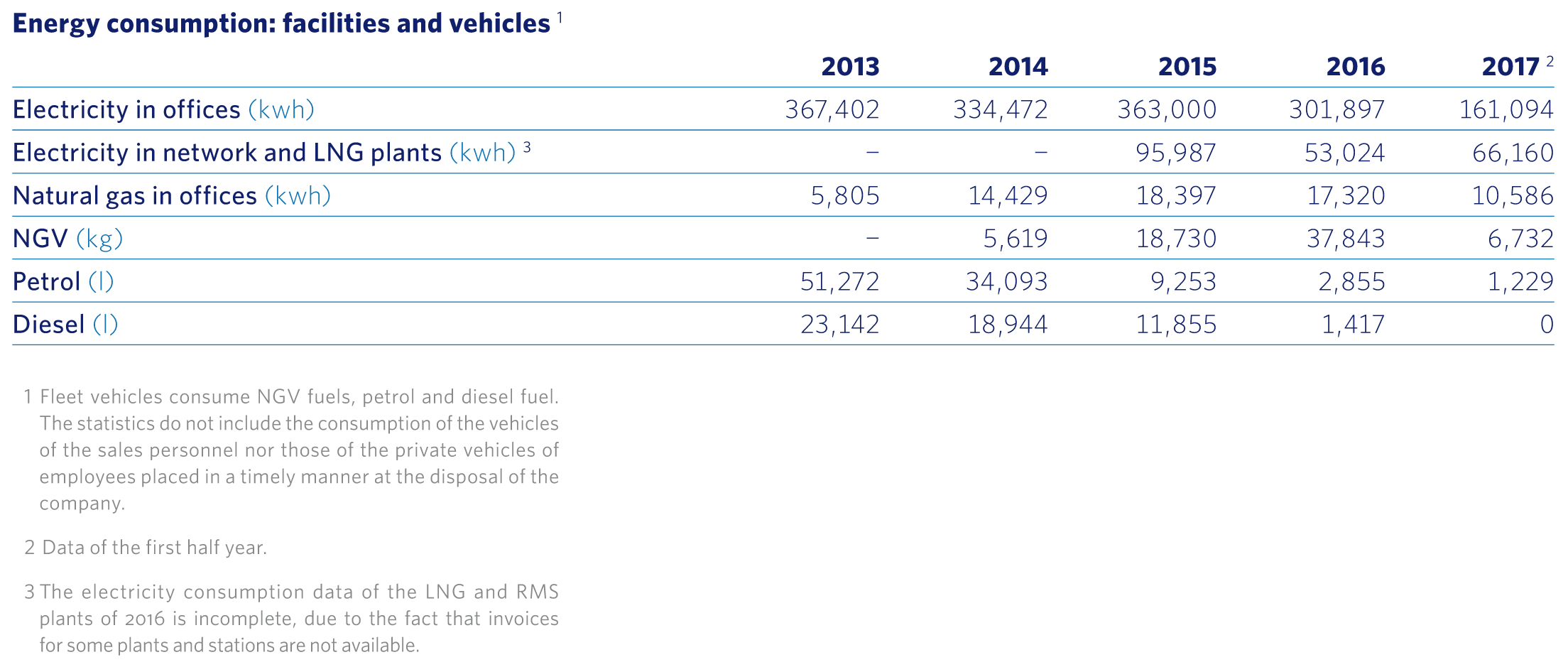
MRG has implemented an active system of environmental management and a continuous improvement of its environmental standards for sustainable growth that respects the environment
6.4 ENVIRONMENT
The protection of the environment is essential for a solid business development with a future projection. Caring for our environment is a task for everyone, especially companies that, like MRG, can directly influence the substitution of fossil fuels for other clean varieties that reduce emissions of pollutants and greenhouse gases.
For MRG, caring for and respecting the environment is not only a commitment, but a fundamental part of its business strategy. Aware of our responsibility to the environment, we want to continue reducing our ecological footprint. Therefore, we ensure that all the resources used are used in the most efficient way possible, taking a step forward in the implementation of an active environmental management system and in the improvement of our environmental standards, which will allow us to grow sustainably respecting the environment and collaborating with the advancement of society towards a better world.
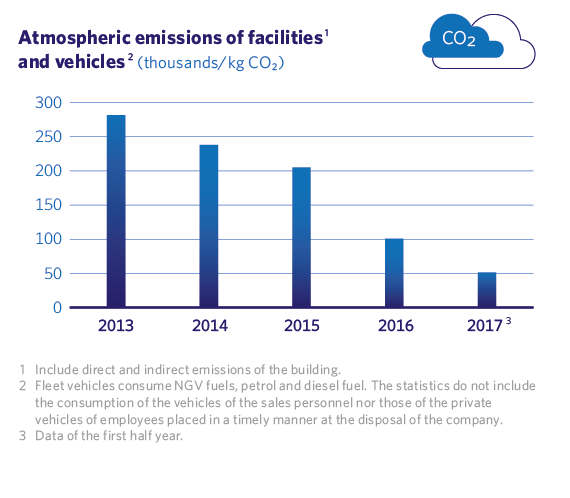
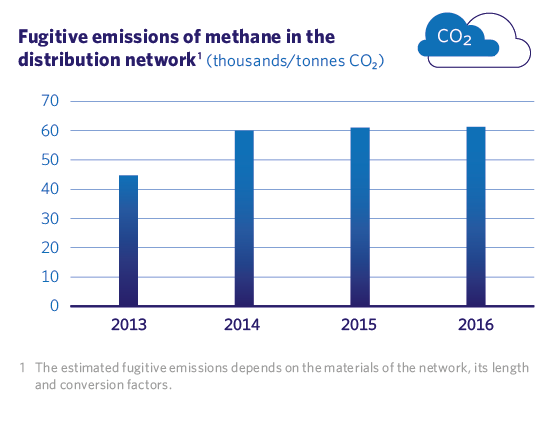
MRG’s policy on environmental management is framed within its philosophy of capitalising on the synergies associated with the integrated prevention, environmental and quality management system
The monitoring audit of the second cycle of the certification of the environmental management system, in accordance with the ISO 14001:2004 standard, as well as the internal audit of the environmental system, were the most significant milestones of this financial year.
The purpose of these audits has been to determine if the environmental management system has been properly implemented and has complied with the plans established for such management, including the requirements of ISO 14001.
In addition, they have provided management with sufficient information to control, plan and review activities that may have an impact on the environment. In the same way, they have allowed us to evaluate the adequacy of the environmental policy for the company itself.
The basic structure of environmental management criteria is framed within the philosophy of capitalising upon the synergies associated with the integrated management system for prevention, environment and the quality of MRG, completing this structure with the review of specific environmental procedures that are considered necessary, as for example, those for the assessment of environmental aspects.
The environmental management system of our company establishes specific annual environmental objectives that, during this financial year, have resulted in the achievement of a reduction in electricity consumption in offices exceeding 2% of the target set. The distribution of MRG environmental information to 100% of the LPG maintainers and the reduction, owing to the high number of supply point captures, of 5% of LNG vented in the LNG plants.
Similarly, during this period, we continued with the monitoring of the environmental indicators chart associated with the environmental management processes that allow us to monitor performance. These indicators show a satisfactory result in terms of resource consumption. It is observed that there is no longer diesel consumption and significantly decreasing gasoline consumption, mainly due to the use of NGV, which leads to a reduction in respective CO2 emissions from vehicles.
The natural gas safety cards without odorant, odorized natural gas and LNG have been defined and registered in the National Institute of Toxicology.

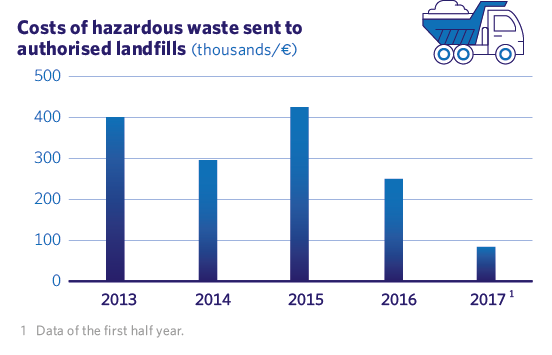
On the other hand, the operation of the LNG plants and the dismantling of the LPG plants have required specific actions from the environment area such as the preparation of reports on the soil situation in the LNG plants, the analysis of waste from the dismantling of LPG plants, noise measurements in LNG and LPG plants, the analysis of requirements for fire prevention in clearings according to Decree 58/2009, of June 4, of the Community of Madrid Forest Fire Emergency Civil Protection Plan, the analysis of the application of the Environmental Responsibility Act, the analysis of regulations applicable to phytosanitary treatments in LNG and LPG facilities, etc.
AIn addition, the project to adapt the system to the requirements of the new ISO 14001:2015 standard has been started, preparing the planning of the expected future changes.
The environmental management system of MRG establishes specific environmental objectives of an annual nature, including the reduction of electricity consumption in our offices which, in this financial year, has exceeded 2 % of the target set
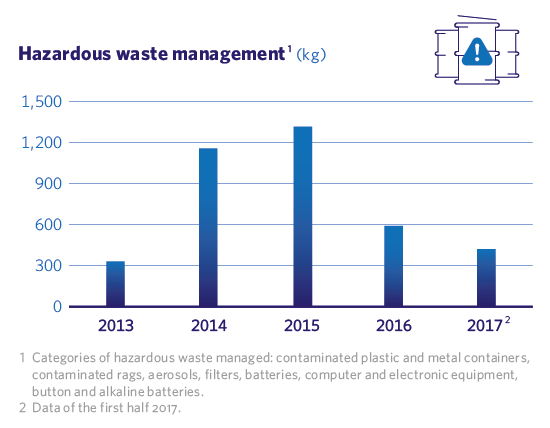
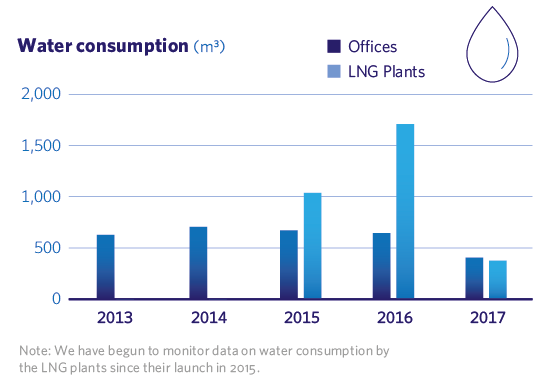
The data reflected in this report correspond to the annual financial year, between July 1, 2016 and June 30, 2017.

